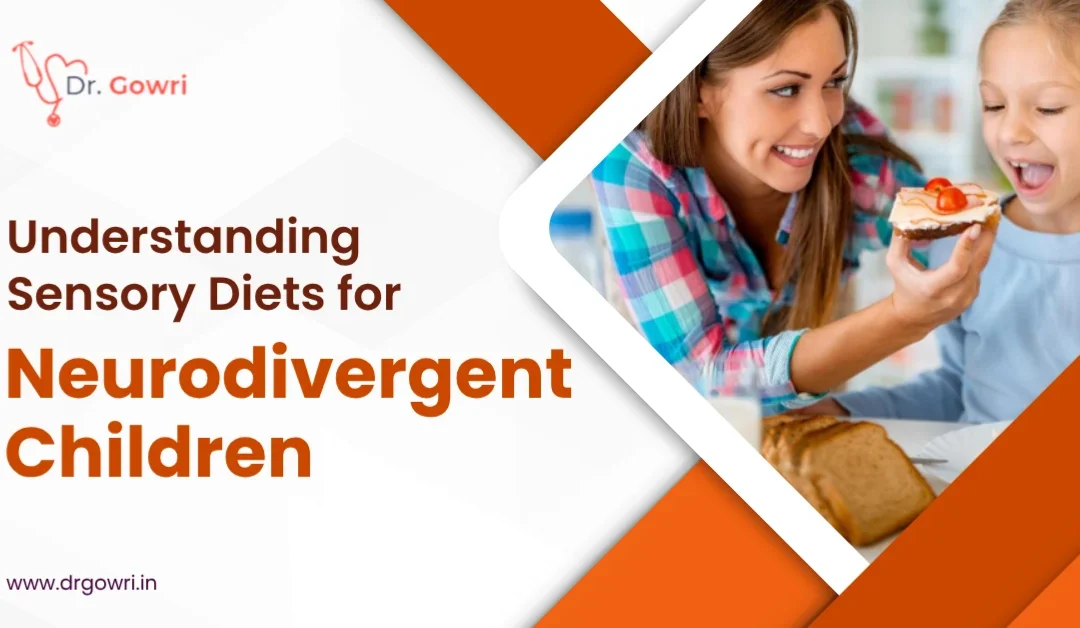“When we meet the sensory needs of children, we open the door to their learning, connection, and growth.”
— Dr. Winnie Dunn
Kids learn the world through their senses — touch, taste, smell, sight, sound, and motion. For neurodivergent children (such as those with autism, ADHD, or sensory processing differences), day-to-day sensory experience can sometimes feel too intense or too bland. You may find your child placing their hands over their ears at loud noises, evading some textures, or fidgeting all the time. This is where a sensory diet can assist.
A sensory diet has nothing to do with food, it’s an individualized list of activities that make your child feel calmer, more focused, and better able to engage in daily life. It’s like a recipe for the body and brain!
What is a Sensory Diet?
A sensory diet is a collection of activities that are picked to address your child’s individual sensory needs. Like daily meals maintain the body, sensory activities keep the nervous system “in balance.”
Some children require more activity such as jumping or swinging, and others may require a calming touch such as soft blankets. Every child’s sensory diet varies since every child’s sensory requirements vary.
Why is a Sensory Diet Necessary?
When children’s sensory requirements are satisfied, they tend to be:
- More relaxed and less anxious
- Better able to focus
- More adaptable in dealing with changes
- More comfortable with their bodies
Without appropriate sensory input, children may search for stimulation such as always spinning, jumping etc., A sensory diet prevents these issues by providing the child with what they require before problems occur.
Signs Your Child May Need a Sensory Diet!
You may observe your child:
- Gets easily overwhelmed by lights, sounds, or crowds
- Has trouble with clothing textures
- Has difficulty sitting still
- Is choosy about food textures
- Covers their ears to keep out noise
- Becomes extremely upset during grooming (such as haircuts or nail trimming)
If these signs can be hampering daily life activities, a sensory diet may be a game-changer.
Examples of Sensory Diet Activities:
The following are some activities that you can include based on your child’s needs:
i) For Children Who Seek Movement (Sensory Seekers)
- Trampoline jumping
- Swinging at the playground
- Racing while running
- Dancing to music
- Carrying or pushing heavy things
ii) For Children Who Avoid Sensory Input (Sensory Avoiders)
- Quiet time in a soft area
- Listening to soft music
- Wearing seamless, soft clothes
- Using weighted blankets for soothing
- Gentle massage or soft-brush brushing
iii) For Building Body Awareness
- Playdough or slime play
- Animal walks (such as bear crawl, crab walk)
- Yoga for children
- Obstacle courses
iv) For Oral Sensory Needs
- Crunchy snack chewing
- Thick liquid sipping through a straw
- Blowing bubbles
How to Create a Sensory Diet at Home?
a) Observe how your child responds to various sensations. What relaxes them? What revs them up? What irritates them?
b) Work with a Professional, and make a plan that’s just right for your child.
c) Create a Daily Routine, because sensory activities will work best if they are used every day, not only when problems occur.
d) Start with a few easy activities your child likes and expand on them.
Conclusion..,
By providing their brain and body with the appropriate type of “sensory food,” you allow them to feel more at ease in the world around them. Keep in mind that each child is different. With patience, love, and the appropriate resources, you can assist your child in growth and improvement.
About the Author

Dr. Gowri Ravi Chinthalapalli is a Developmental and Family Physician with over 16 years of experience in child development and family medicine. She has treated more than 50,000 patients worldwide. After completing her MBBS from Rajiv Gandhi University of Health Sciences, she pursued MRCGP from the UK and gained wide experience in primary care and emergency medicine. She also holds a Fellowship in Child Development from the Centre for Child Development and Disabilities, Bengaluru. Dr. Gowri currently practices at Aster CMI Hospital and Canara Diagnostic Centre, Bengaluru. She is passionate about guiding families, supporting children with developmental needs, and providing holistic care.

